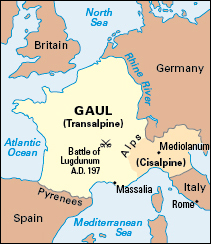Gallic, << GAL ihk, >> Wars were a series of Roman military campaigns from 58 to 51 B.C. During the wars, the Roman statesman and general Julius Caesar conquered most of ancient Gaul, bringing within the Roman Empire what are now Belgium, France, and Luxembourg, and the parts of Germany and the Netherlands that lie west of the Rhine River.
The wars.
In the 100’s B.C., Roman forces had conquered the Gauls in what is now southern France, and this area had come under Roman control. The rest of Gaul was made up of many independent tribal states. Some of these states cooperated with the Romans as allies. For example, they provided soldiers and supplies for the Roman army in local conflicts. Other states resisted helping the Romans but could not count on support from their neighbors. This lack of unity allowed Caesar to fight the Gallic peoples individually and defeat them.

In 58 B.C., in the first campaign of the wars, Caesar responded to a request by the Aedui, a people of central Gaul, for protection from another group called the Helvetii or Helvetians. The Helvetii were migrating west through Aeduan territory from what is now Switzerland. Caesar crushed the Helvetii. He then strengthened his alliance with the Aedui by freeing them from domination by a German chief named Ariovistus. Further campaigns to the north, west, and south brought virtually all of Gaul under Roman authority. In 55 and 54 B.C., Caesar also led two raids across the English Channel to Britain.
In 52 B.C., the Gallic warrior Vercingetorix united most of Gaul in a common revolt against Roman domination. However, Caesar ultimately defeated Vercingetorix, and the cause of Gallic freedom was lost.
Results of the wars.
Caesar won great wealth and prestige from his victories in Gaul. His growing power alarmed many leading Romans. A civil war broke out in 49 B.C. between the forces of Caesar and the Roman general Pompey. Caesar emerged victorious and became the leader of the Roman world.
The Gallic Wars also spread Roman culture to northwest Europe. The human cost of the wars was enormous. An ancient source claims that as many as 1 million Gauls were killed in battle and another million were captured. These numbers probably are greatly exaggerated, but they do indicate that Gallic losses were extremely heavy. Caesar wrote a detailed memoir of the conflict called Commentaries on the Gallic War.
See also Caesar, Julius ; Gaul ; Pompey the Great ; Vercingetorix .
